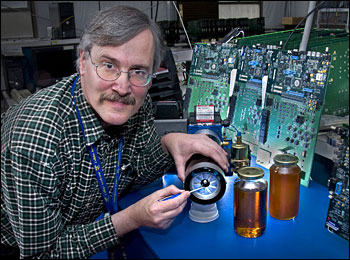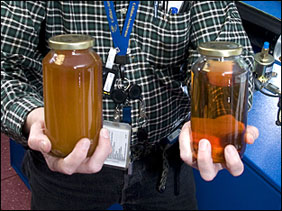Meet Ron Schroeder
An Innovative Energy Conservationist
January 5, 2009
What is my carbon footprint? Does this car get enough miles per gallon? Should I buy solar panels for my house? When is the best time to fill the home-heating oil tank? Is there alternative energy that I should use?
Have you found yourself questioning your energy usage and the financial and environmental costs? Ron Schroeder of Brookhaven Lab's Collider-Accelerator Department has-for more than 30 years. As a result, he has created his own alternative-energy systems for both his car and his home.
 enlarge
enlarge
Ron Schroeder points to the main component of his home-heating, recycled cooking oil burner.
Schroeder, an electronic technician, is a native of Ohio and the son of a chemist who lived through the Great Depression; he is also one resourceful guy. His first alternative-energy projects stemmed from an amateur radio hobby in which he designed solar and lard fuel systems to power radio equipment on mountaintops where electricity was not available.
Since Schroeder's early successes using lard to power a diesel generator for radio equipment, he has continued to use recycled cooking oils in a number of ways. "A diesel engine can run on almost any combustible fluid that you can inject in it," he explained. "Gasoline and diesel fuel was inexpensive back when I started, but I knew that the local McDonald's was having a problem getting rid of the lard used to cook French fries. I was able to put it to good use for a few things."
Hit the Road, Ron
In early 1981, Schroeder expanded his work on the diesel generator powered by French fry lard and installed a similar, second heated-fuel system in his one-year-old, diesel-powered Audi. The modified car still started with ordinary diesel fuel but during the first few minutes of driving, the heat emitted from the motor was used to melt and thin the recycled lard. Once the lard was heated to a liquid state, Schroeder could then power the engine with the lard fuel system.

Before Ron Schroeder purifies and removes water from the recycled cooking oil, raw, recycled cooking oil is cloudy yet translucent. The purified, de-watered recycled cooking oil that is ready for use is transparent.
When restaurants shifted to healthier vegetable oils rather than lard, Schroeder's modified cars continued to run efficiently. "Regardless of what was cooked in the oil I use, most people say that the exhaust smells like burgers and steak. It doesn't smell as much as diesel fuel though," Schroeder said while listing the advantages of his vegetable oil-powered motors. "The alternate fuel systems also emit fewer greenhouse gases because they come from renewable CO2 neutral sources. There are fewer unburned nitrous oxide and sulfur oxide compounds so it contributes less to pollution and acid rain."
While Schroeder's recycled cooking oil systems have worked well for him, he does not claim that they are the solution to the country's dependence on fossil fuels. "If everyone in New York modified their cars, there would probably only be about 12 gallons of recycled vegetable oil for each person per year. Not to mention, preparing the fuel is very time consuming." Schroeder must clean all of the recycled vegetable oil before using it, not only to remove leftover food scraps, but to remove water particles suspended in the recycled oil that would dramatically reduce the life of the engine.
Still, Schroeder has stuck with the system that has worked well for him and he said that he would not hesitate to drive his current car, a modified 1985 diesel Mercedes Benz, for a long stretch. "I would have to fill my trunk with jugs of pre-cleaned oil before leaving because there isn't any good way of de-watering the oil on the road. But if I were ever in a bind on the road, I could still run the car off of regular diesel fuel or buy jugs of new, clean cooking oil," Schroeder added.
Bringing It All Back Home
When Schroeder modified a car or truck, he added a separate tank, fuel lines and filter to carry cooking oil fuel to the vehicle's engine. Whether he used cooking oil or regular diesel fuel, either produced about the same power in the same engine. Schroeder faced a different challenge when he decided to heat his 10-room, Cape-style house using cooking oils: he had to build the home-heating equivalent of the car engine - a burner where the oil would be processed and create the heat for his entire home.
"The burner is especially difficult compared to converting a Diesel vehicle," Schroeder said.
The completed piece is nearly the same size as a regular home-heating oil burner and can provide heat using either regular home-heating oil or vegetable oil. The system uses electricity to heat the oil to 300 degrees Fahrenheit, reducing its viscosity. The system is also more efficient than a regular oil burner because it uses compressed air to more fully atomize, or evenly disperse, the oil within the unit. In one year, Schroeder's heating system uses well under 275 gallons of recycled cooking oil because his house is so well insulated and it burns much cleaner than a traditional home-heating oil system.
In addition to the cooking oil home-heating system, Schroeder utilizes other sources of alternative energy in his home. He has a geothermal cooling unit rather than a standard air conditioner. This unit uses the Earth's constant underground temperature of about 55 degrees Fahrenheit to keep the house cool during the summer. Schroeder also employs solar PV panels to provide his home with electricity throughout the day. "My solar electricity is tied in to LIPA's grid, so I sell electricity to LIPA when I produce more than I use and I buy back what I need when the sun's not out. Financially, it usually balances out pretty well," he said.
What's a Long Islander To Do?
If you find yourself hesitating to turn the heat up this winter or filling your gas tank more often than you like, consider Schroeder's advice: "It's usually better to save (conserve) energy than to find a better source of it." For homeowners, Schroeder recommends focusing on proper insulation and air sealing for the home, not only rushing to install solar panels. "By keeping heat in and drafts out during the winter, it's easier to be more comfortable while using less energy," he said. "For the long term, we DO have to find better sources of energy."
For those of us who must drive to work, Schroeder believes biodiesel-blended fuels offer the same advantages as his waste cooking oil system without requiring vehicle modifications. But these fuels are not yet available on Long Island. In the meantime, he recommends checking tire pressure, performing routine maintenance, and not over-accelerating. "The best ways to conserve energy are often very low-tech," he stated.
Schroeder has more advice for those who would like to switch to more alternative energy solutions. "Remember that there is no single alternative energy solution that will automatically save the environment and bolster your savings account," he said. "Before you do anything, consider the types of energy that you use, where it comes from, and where it goes. Re-evaluate whether or not these are the most efficient and cost-effective options available to you."
So the next time you hear the old cliché "Life is a journey," remember that Ron Schroeder has traveled for more than thirty years on the goop you can find in the grease dumpster behind your local McDonald's.
 Think you or one of your colleagues has a good story to tell? Email us! Although we can't write about everyone, we would love to hear your ideas and suggestions.
Think you or one of your colleagues has a good story to tell? Email us! Although we can't write about everyone, we would love to hear your ideas and suggestions.
2009-784 | INT/EXT | Newsroom









